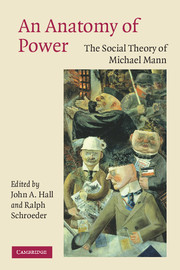Book contents
- Frontmatter
- Contents
- List of figures
- List of contributors
- 1 Introduction: the IEMP model and its critics
- Part I Theory, practice, method
- Part II Types of power
- Part III European exceptionalism?
- 10 From theory to history: ‘The European Dynamic’ or feudalism to capitalism?
- 11 The rise of the West
- 12 A historical, not comparative, method: breakthroughs and limitations in the theory and methodology of Michael Mann's analysis of power
- Part IV Promise and perils of modernity
- Part V Response
- Bibliography of Michael Mann's Writings
- Index
- References
11 - The rise of the West
Published online by Cambridge University Press: 22 September 2009
- Frontmatter
- Contents
- List of figures
- List of contributors
- 1 Introduction: the IEMP model and its critics
- Part I Theory, practice, method
- Part II Types of power
- Part III European exceptionalism?
- 10 From theory to history: ‘The European Dynamic’ or feudalism to capitalism?
- 11 The rise of the West
- 12 A historical, not comparative, method: breakthroughs and limitations in the theory and methodology of Michael Mann's analysis of power
- Part IV Promise and perils of modernity
- Part V Response
- Bibliography of Michael Mann's Writings
- Index
- References
Summary
The appearance in 1986 of the first volume of Michael Mann's trilogy (Mann 1986) brought to an end an extraordinarily fruitful decade, during which a heterogeneous group of economic historians (Mendels 1972; Jones 1981; Brenner 1982), economists (North 1981), and historical sociologists (Anderson 1974a; 1974b; Wallerstein 1974–80; and Hall 1985) jointly attacked, challenged and rewrote many of the established narratives of premodern European history. Mann's empirical range was greater, his theoretical ambitions broader and his analytical scope more encompassing and compelling than most; but he shared with this group the core aim of defining and explaining the mystery of the ‘European miracle’, and it is on this matter that Mann's thoughts are arguably most incisive and original.
Our understanding of the premodern (medieval and early modern) economy has changed significantly since 1986, not least thanks to the works I have just mentioned, which set in motion a more systematic use of cross-cultural comparison and more rigorous, social science-based analysis; other influential developments are more recent, like the rise of ‘global history’ and the irruption of southeast Asian economic history into European historians' consciousness discussed by others in this volume.
- Type
- Chapter
- Information
- An Anatomy of PowerThe Social Theory of Michael Mann, pp. 233 - 262Publisher: Cambridge University PressPrint publication year: 2006
References
- 1
- Cited by

